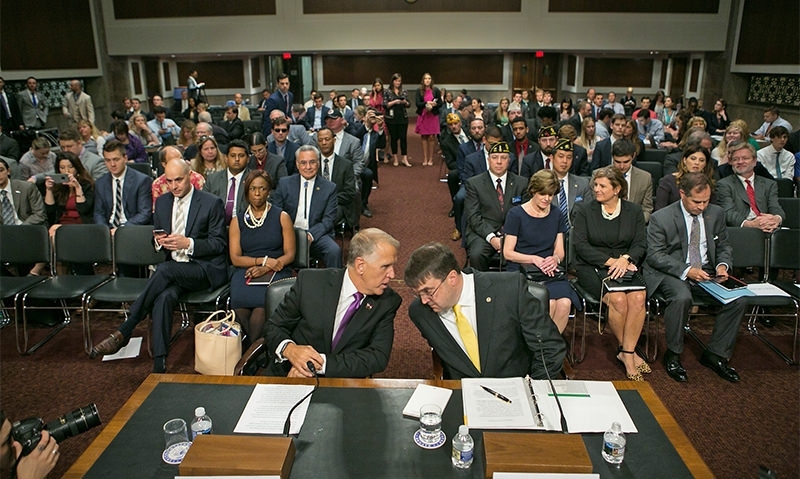
The nominee vowed to resist any efforts to privatize the nation’s largest health care system.
Robert Wilkie, who is nominated to be the next secretary of the Department of Veterans Affairs (VA), vowed to resist any efforts to privatize the nation’s largest health care system during his confirmation hearing June 27 before the Senate Committee on Veterans’ Affairs.
If confirmed, Wilkie will take over as the VA’s head during a crucial time for the department. The VA signed a $10 billion contract with Cerner for a new electronic health record system and the MISSION Act – a comprehensive piece of legislation overhauling veteran’s health care – was recently signed into law.
“The sacred mission of serving our nation’s veterans and their families has always transcended personal political agendas or political affiliations,” said committee ranking member Jon Tester, D-Mont., in his opening remarks where he called on Wilkie to ensure he will act with the best intentions when it comes to the care of veterans.
“My best advice to you,” Tester said, “is to take the cues from the veterans … and do what you think is right even if political forces threaten your job.” Tester added that previous VA officials had not allowed politics to impede progress.
During the hearing, Wilkie said he believes the most difficult challenges the VA is facing are bureaucratic and administrative.
“Many of the issues I encountered as acting secretary were not with the quality of medical care but with getting our veterans through the door to reach that care,” Wilkie told the committee, noting that he will rely on his experience working as the Undersecretary of Defense for Personnel and Readiness to make improvements at the VA.
“For the VA to thrive as an integrated health network, it must be agile and adaptive,” he said.
The implementation of the MISSION Act will be one of the biggest hurdles Wilkie will face if confirmed. Designed to overhaul how veterans receive their health care and expand the community care program, some opponents say it paves the way for the privatization of the nation’s largest health care system.
“There is … overwhelming opposition to the privatization of the VA from The American Legion, VFW … and all the major veterans organizations,” said Sen. Bernie Sanders, I-Vt. When asked by Sanders if he believed in the privatization of VA, Wilkie responded that he would work against any efforts to privatize VA.
“I experienced what can never be duplicated in the private sector. And that is the communal aspect of VA,” Wilkie said. “This means when veterans walk into any VA facility, they converse with men and women who speak the unique language of military service.”
Improving access to care through the implementation of the MISSION Act is one of his highest priorities, he noted. Reducing the backlog of claims, improving culture and customer service are also amongst the top priorities, as well as working to fill the over 33,000 vacancies at the VA.
"It is clear that the veterans population is changing faster than we realize," Wilkie said. "For the first time in 40 years, half of our veterans are under the age of 65. Of America's 20 million veterans, 10 percent are now women. The new generation is computer savvy and demands 21st century service – service that is quick, diverse and close to home."
Wilkie recently served as the VA acting secretary in the wake of David Shulkin’s firing from the position. He is a colonel in the Air Force reserve assigned to the Office of the Chief of Staff. Before his first Pentagon tour, he was special assistant to the president for National Security Affairs and a senior director of the National Security Council under Dr. Condoleezza Rice. It is expected that the Senate will vote on Wilkie's appointment in the coming days.
- Veterans Healthcare

